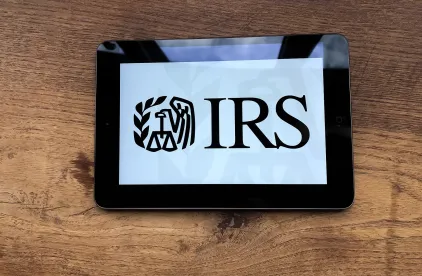On Sept. 14, 2023, the IRS announced an immediate moratorium on the processing of amended returns claiming Employee Retention Credits (ERC). The moratorium, which is set to run through the end of 2023, is a new IRS tactic to deal with what it perceives to be an onslaught of improper ERC claims driven by aggressive promoters. The IRS indicated the moratorium was necessary to provide safeguards to prevent ERC abuse and to protect businesses from predatory tactics. In furtherance of that purpose, the IRS announced two initiatives: (i) a withdrawal option for pending ERC claims; and (ii) a repayment settlement program for those taxpayers who were paid on an ERC claim but who no longer believe they were eligible for the ERC.
Summary of the ERC
The ERC allows a refundable tax credit, so the taxpayer receives a check from the IRS in the amount the credit exceeds the tax. The ERC is 50% for wages paid between March 13, 2020, and Dec. 31, 2020 (with a maximum credit of $5,000 per employee for all of 2020) and a 70% credit for wages paid in the first, second, and third quarters of 2021 (with a maximum credit of $7,000 per quarter). To be eligible for the credit, there are two threshold requirements: (1) the company must have had no more than 100 full-time employees in 2019 for purposes of taking the credit for wages paid during 2020 and no more than 500 full-time employees in 2019 for purposes of taking the credit for wages paid in 2021; and (2) one of the following tests must be satisfied: (i) the taxpayer had a significant decline in gross receipts for the quarter the ERC is being claimed compared to the same quarter in 2019 (a 50% or greater reduction in gross receipts for 2020 quarters and a 20% or greater decline in gross receipts for 2021 quarters); or (ii) the taxpayer’s business operations were either fully suspended or partially suspended as a result of COVID-19-related government order.
The ERC Consulting Industry
There are many other ERC requirements and limitations, so the analysis of whether a business should take advantage of the credit can be complex. This has led to the emergence of consulting firms to guide businesses through the labyrinth of rules.
The IRS has continuously warned of promoters that have been aggressively marketing the ERC to business that may not be eligible to claim the ERC. See previous GT Alerts. Contemporaneous with the moratorium announcement, the IRS updated its ERC guidance to include an eligibility checklist, a list of ERC red flags, and a new ERC eligibility question-and-answer guide to further educate and warn businesses of misleading eligibility claims made by aggressive promoters and to help businesses better understand if they are eligible for the ERC.
Inundated with Claims
Since the beginning of the pandemic in 2020, the IRS has received approximately 3.6 million ERC claims, with more than 600,000 ERC claims being filed within the last few months but not yet processed by the IRS. The IRS has warned businesses for months that predatory promoters are aggressively marketing ERC claims to businesses, leading to a large number of ERC claims where the business may not be eligible to claim the ERC. In its announcement of the mortarium, IRS Commissioner Daniel Werfel indicated that the IRS is currently receiving a “tsunami” of ERC claims when the IRS believes they should only be receiving a “trickle” at this point in time. Commissioner Werfel further acknowledged that “the continued aggressive marketing of these schemes is harming well-meaning businesses and delaying the payment of legitimate claims, which makes it harder to run the rest of the tax system.”
IRS Initiatives Coming for Ineligible Claims
In its announcement of the moratorium, the IRS urged taxpayers to immediately pause and review their ERC eligibility. Those taxpayers that now believe they may not be eligible to claim the ERC and were taken advantage of by aggressive promoters may consider two new initiatives previewed by the IRS.
1. |
|
Special Withdrawal of Pending ERC Claim |
The IRS is looking to enact a special withdrawal option for those taxpayers who have filed an ERC claim that the IRS has not yet processed. While this option may help avoid any repayment issues, the IRS warned it will not preclude criminal prosecution of those taxpayers who willfully filed a fraudulent ERC claim. Details regarding this option are expected soon. A taxpayer who entered into a contingency fee arrangement with an ERC consulting firm might get pushback on entering into a withdrawal program with the IRS; under such fee arrangements the consultant does not need to get paid until the taxpayer receives the refund.
2. |
|
Settlement Program for Refunds of Ineligible ERC Claims |
The IRS is also working on details of a settlement program that would impact those businesses that have already received refunds from ERC claims but now believe they claimed the refunds improperly. It is expected that the businesses would have to repay the ERC claims (including any portion of the ERC refund that went to pay the ERC consulting firm) in exchange for penalty relief. In any repayment settlement program, the IRS will have to consider the impact of any ERC repayments on the income tax reporting of the taxpayer. Taxpayers who filed an amended employment tax return to claim the ERC were then required to reduce the income tax deduction for wages paid by the amount of the ERC credit. If a taxpayer is now repaying the ERC credit, then they should be entitled to the full income tax deduction for wages paid in that period.
Ineligible taxpayers that submitted ERC claims need to weigh whether these options are right for them, especially since the IRS announced it has trained numerous agents to aggressively audit ERC claims posing the greatest risk, and the IRS Criminal Investigation Division is actively working to identify potential tax fraud and promoters of fraudulent claims for potential referral for prosecution to the Department of Justice.




 />i
/>i

